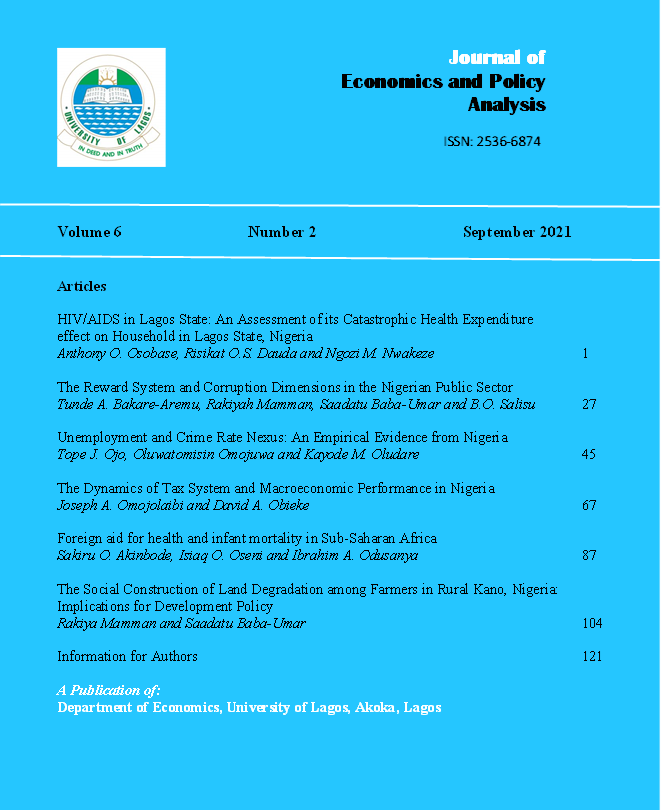The Dynamics of Tax System and Macroeconomic Performance in Nigeria
Abstract
This study examined the effects of the dynamics of tax system on macroeconomic performance in Nigeria covering the period between 1980 and 2019. The study employed autoregressive distributive lag (ARDL) model as the estimation technique which enabled the determination of the short run (SL) and long run (LR) relationship between tax revenue and macroeconomic performance. Five models were specified; in model 1, the short-run result shows that the Customs and Excise Duties (CED) has negative and significant impact on Gross Domestic Product (GDP), indicating that a percent change in CED will reduce (GDP) by 2.4%. In Model II, in the SR and LR, CED has positive and insignificant impact on inflation, suggesting that a percent change in CED will increase rate of inflation by 16.2% in the short run and 6.88% in the long run. In Model III, a percent change in Petroleum Profit Tax (PPT) will reduce public debt by 0.10% and 0.79% in the short run and long run respectively. In Model IV, CED, PPT and Value Added Tax (VAT) exert a negative but significant influence on unemployment. This means that a percent change in the aforementioned control variables will increase the unemployment rate by 0.00%, 29.3% and 0.19% respectively. In Model V, both in the short run and in the long run, the computed dynamics of tax system has a positive and significant influence on macroeconomic performance in Nigeria, that is, a percent change tax system in Nigeria will increase macroeconomic performance by 0.10% and 3.05%. Hence, taxation should be relied upon to address inflation, economic growth, unemployment, public debt challenges and other macroeconomic fundamentals. It should be at the core of a fiscal policy mix for mobilizing domestic resources on a sustainable manner for socioeconomic development of the country.
References
A. I., & James, G. B. (2017). Tax Revenue and Its Effect on Selected Macroeconomic Indicators in Nigeria. Elixir Journal of Finance Management, 113(17), 49247-49254.
Chigbu, E.E., Akujuobi, L. E., & Appah, E. (2012). An empirical study on the causality between economic growth and taxation in Nigeria. Current Research Journal of Economic Theory, 4(2), 29-38.
Cloyne, J. (2013). Discretionary tax changes and the macroeconomy: New narrative evidence from the United Kingdom. American Economic Review, 103(4), 1507-1528.
Morina, F., & Misiri, V. (2019). Impact of taxation, public debt and subsidiaries in the budget deficit of Western Balkan countries. Knowledge International Journal, 31(1), 95-100.
Musgrave, R.A., & Musgrave, P.B. (1984). Public finance in theory and practice. McGraw Hill International Editions.
Naomi, O.D., & Sule, A. (2015). The potential of company income tax on the search for sustainable alternative finance in Nigeria. Journal of Emerging Trends in Economics and Management Sciences, 6(7),199-206.
Ogbonna, G.N., & Ebimobowei, A. (2012). Impact of tax reforms and economic growth of Nigeria: A time series analysis. Current Research Journal of Social Sciences, 4(1), 62-68.
Olawunmi, O., & Ayinla, T.A. (2007). Fiscal policy and Nigerian economic growth. Journal of Research in National Development, 5(2), 19-29.
Omojolaibi, J.A. (2012). Fiscal stance and macroeconomic performance in Nigeria, Unpublished Ph.D Thesis, University of Ibadan. Ibadan.
Pitchford, J., & Turnovsky, S.J. (1976). Some effects of taxes on inflation. The Quarterly Journal of Economics, 523-539.
Romer, P.M. (1994). The origins of endogenous growth. Journal of Economic perspectives, 8(1), 3-22.
Romer, C., & Romer, D.H. (2010). The macroeconomic effects of tax changes: Estimates based on a new measure of fiscal shocks. American Economic Review, 100(3), 763-801.
Tosun, M.S., & Abizadeh, S. (2005). Economic growth and tax components: An analysis of tax changes in OECD countries. Applied Economics, 37, 2251-2263.
Umoru, D., & Anyiwe, M.A. (2013). Tax structures and economic growth in Nigeria: Disaggregated empirical evidence. Research Journal of Finance and Accounting, 4(2), 65-79.
Worlu, C.N., & Nkoro, E. (2012). Tax revenue and economic development in Nigeria: A macroeconometric approach. Academic Journal of Interdisciplinary Studies, 1(2), 211-223.


